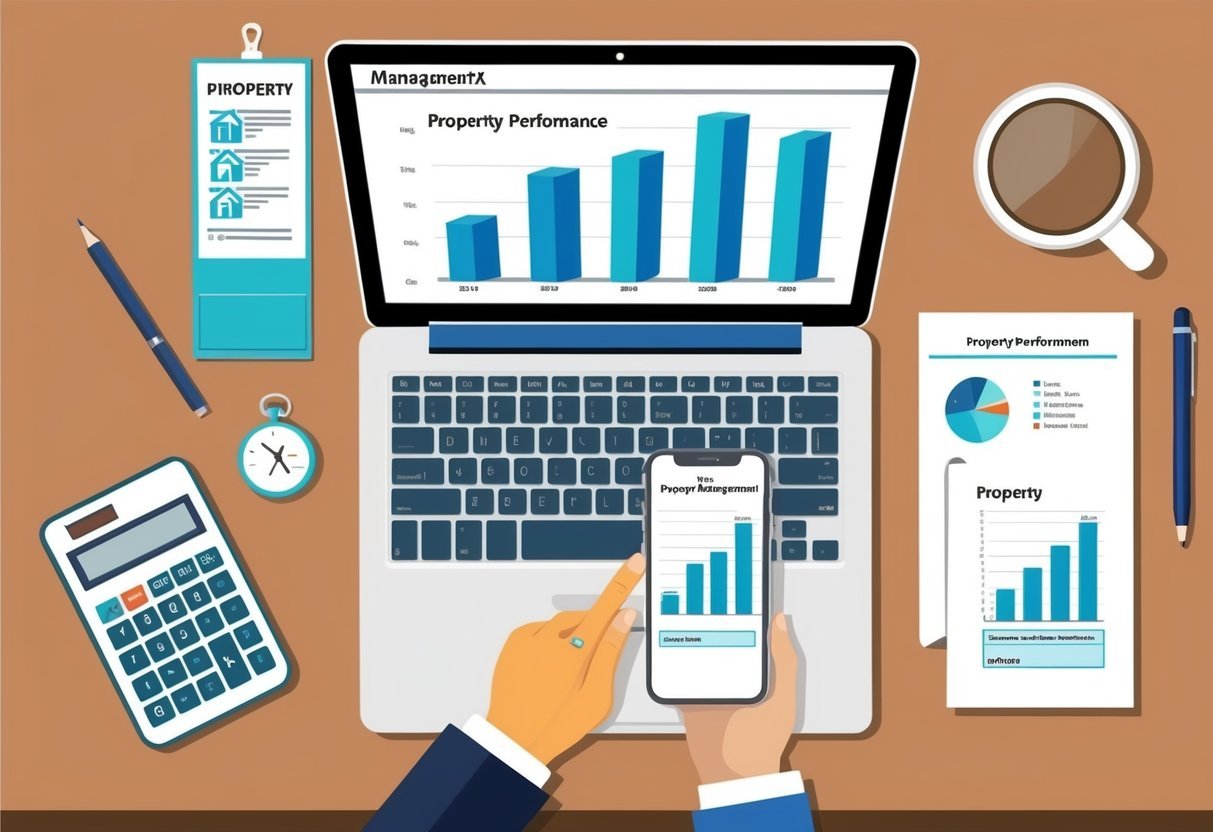Real estate investment can be a lucrative venture, but managing a diverse portfolio of properties requires organization and efficiency.
As your investments grow, keeping track of finances, tenants, and maintenance across multiple properties becomes increasingly complex.
Fortunately, there are numerous tools available to help streamline your real estate investment management process.

The right software can significantly boost your productivity and profitability as a real estate investor. These tools offer features ranging from financial analysis and property valuation to tenant screening and rent collection.
By leveraging technology, you can make more informed decisions, reduce administrative burdens, and focus on growing your real estate empire.
1) Cozy
Cozy is a valuable tool for managing your real estate investment portfolio.
This user-friendly platform offers a range of features to streamline your property management tasks.
With Cozy, you can easily collect rent payments online.
This automated system ensures timely transactions and reduces the hassle of dealing with paper checks or cash.
The software also helps you screen potential tenants.
You can access credit reports and background checks for a fee, allowing you to make informed decisions about who occupies your properties.
Cozy provides a centralized location for lease management.
You can store important documents, track lease terms, and set reminders for upcoming renewals or inspections.
The platform offers basic accounting features to help you keep track of your income and expenses.
This can be particularly useful during tax season or when evaluating the performance of your investments.
Communication with tenants becomes more efficient through Cozy’s messaging system.
You can send announcements, address maintenance requests, and maintain a record of all interactions in one place.
While Cozy offers many features for free, some advanced tools come at a cost.
For instance, expedited ACH deposits into your account are available for a small fee per transaction.
2) RealEstateFlow
RealEstateFlow offers a comprehensive suite of tools for real estate investors.
You’ll find features designed to streamline your property management tasks and boost your investment performance.
The software provides robust lead generation capabilities.
You can quickly identify potential investment opportunities and track them through the acquisition process.
Property analysis tools help you make informed decisions.
You can evaluate deals, calculate potential returns, and compare different investment options side by side.
RealEstateFlow also includes project management features.
These allow you to oversee renovations, track expenses, and manage contractors all in one place.
The platform’s financial tracking tools are particularly useful.
You can monitor cash flow, generate financial reports, and keep tabs on your overall portfolio performance.
Marketing automation features help you promote your properties effectively.
You can create targeted campaigns and manage your online presence to attract tenants or buyers.
Real estate investment software like RealEstateFlow can significantly improve your efficiency as an investor.
By centralizing your data and automating routine tasks, you’ll have more time to focus on growing your portfolio.
Remember to explore the platform’s training resources.
These can help you maximize the value you get from the software and stay up-to-date with best practices in real estate investing.
3) Reonomy
Reonomy is a powerful tool that can revolutionize your real estate investment portfolio management.
This AI-powered platform uses advanced algorithms and machine learning to aggregate and analyze commercial real estate data from multiple sources.
With Reonomy, you gain access to comprehensive property intelligence that can help you make informed investment decisions.
The platform provides detailed information on property ownership, transaction history, and financial data for millions of commercial properties across the United States.
You can use Reonomy to identify potential investment opportunities, conduct thorough due diligence, and assess market trends.
The tool’s proprietary algorithms restructure data using a universal language, allowing you to unlock the true value of your commercial real estate database.
Reonomy’s user-friendly interface enables you to search for properties based on specific criteria, such as location, property type, and sales history.
This feature can save you significant time and effort in your property research process.
The platform also offers valuable insights into property ownership, allowing you to connect directly with property owners for potential off-market deals.
This can give you a competitive edge in finding lucrative investment opportunities.
By incorporating Reonomy into your real estate investment strategy, you can streamline your workflow and make data-driven decisions to optimize your portfolio’s performance.
4) PropertyMetrics
PropertyMetrics is a powerful tool that can revolutionize how you manage your real estate investment portfolio.
This software offers a comprehensive suite of features designed to streamline your property analysis and decision-making processes.
With PropertyMetrics, you can easily track and analyze key performance indicators for your investments.
The platform provides robust financial modeling capabilities, allowing you to create detailed projections and scenarios for potential acquisitions.
You’ll appreciate the intuitive interface that makes it simple to input property data and generate insightful reports.
These reports can help you gauge whether a property is performing well for your portfolio.
PropertyMetrics excels at calculating important metrics such as internal rate of return (IRR), net present value (NPV), and cash-on-cash return.
These calculations give you a clear picture of your investments’ profitability and potential.
The software also offers collaborative features, enabling you to share reports and analyses with partners or clients.
This can be particularly useful when working on joint ventures or presenting opportunities to investors.
By using PropertyMetrics, you can make more informed decisions about your real estate investments.
The tool helps you identify areas of high growth potential and assess the impact of various factors on your properties’ values.
5) Stessa
Stessa offers a powerful solution for managing your real estate investment portfolio.
This cloud-based software automatically tracks income and expenses for your properties, simplifying financial management.
With Stessa, you can monitor property performance in real-time.
The owner dashboard provides valuable insights to help you optimize decision-making and improve returns on your investments.
As a landlord, you’ll appreciate Stessa’s user-friendly interface.
The platform makes it easy to keep track of your real estate investments, saving you time and reducing stress.
Stessa’s mobile app allows you to manage your portfolio on the go.
You can access important information and make updates from anywhere, ensuring you’re always in control of your investments.
The software also aids in generating reports and organizing documents.
This feature proves invaluable during tax season, helping you stay compliant and maximize deductions.
Stessa integrates with other real estate tools, enhancing its functionality.
You can connect it with platforms for digital signatures, property management, and more, creating a seamless workflow.
By using Stessa, you’ll gain a clearer picture of your real estate portfolio’s performance.
This insight can guide future investment decisions and help you grow your wealth more effectively.
6) DealCheck
DealCheck is a powerful real estate analysis software and calculator designed to help you evaluate potential investment properties quickly and accurately.
This tool allows you to crunch numbers and perform due diligence on various types of real estate investments.
You can use DealCheck to analyze rental properties, BRRRR deals, fix-and-flip projects, multi-family buildings, and even commercial real estate.
The app’s user-friendly interface makes it easy to input property data and generate comprehensive reports.
One of DealCheck’s standout features is its ability to calculate passive income potential for your investments.
This can help you make informed decisions about which properties are likely to provide the best returns.
The DealCheck mobile app is available for both iOS and Android devices, allowing you to analyze properties on the go.
You can quickly import property data from public records or enter it manually through a step-by-step wizard.
With DealCheck, you’ll have access to detailed financial projections, including cash flow analysis, return on investment calculations, and property value estimates.
This information can be invaluable when making decisions about potential real estate investments.
Many investors appreciate DealCheck for its simplicity and efficiency.
It can save you time and help you avoid costly mistakes by providing a thorough analysis of each property you’re considering.
7) Buildium
Buildium is a comprehensive property management software that can help you streamline your real estate investment operations.
This cloud-based platform offers a wide range of features designed to simplify your day-to-day tasks.
With Buildium, you can easily manage your properties, tenants, and finances in one centralized location.
The software allows you to collect rent online, track maintenance requests, and generate financial reports with just a few clicks.
One of the standout features of Buildium is its tenant screening tool, which helps you make informed decisions when selecting renters for your properties.
This can save you time and potential headaches down the road.
The platform also offers a tenant portal, enabling your renters to pay rent, submit maintenance requests, and access important documents online.
This self-service feature can significantly reduce your administrative workload.
Buildium’s accounting tools are particularly robust, allowing you to track income and expenses, reconcile bank accounts, and generate tax documents with ease.
This can be especially helpful come tax season.
For larger portfolios, Buildium offers scalable solutions that can grow with your business.
Whether you manage a handful of properties or thousands of units, the software can adapt to your needs.
8) AppFolio

AppFolio offers comprehensive real estate investment management software designed to streamline your portfolio operations.
This all-in-one solution helps you manage and grow your investments with ease.
You can optimize your fundraising workflow using AppFolio’s suite of tools.
These features assist in promoting new offerings and automating the calculation and payment of distributions.
The platform enables you to manage assets and enhance investor relations efficiently.
It provides accuracy and simplicity in handling complex portfolio tasks.
AppFolio Investment Manager allows you to automate internal operations while adding an extra layer of security.
You can raise capital efficiently, customize reports, and securely share sensitive documents.
The software also facilitates electronic signatures and helps you track potential deals.
These features can significantly improve your workflow and decision-making processes.
With AppFolio, you can streamline your real estate investment management tasks.
This tool can help you save time, reduce errors, and focus on growing your portfolio.
9) Rentec Direct

Rentec Direct is a comprehensive property management software designed to streamline your real estate portfolio operations.
This tool offers a range of features to help you manage your properties efficiently.
With Rentec Direct, you can easily track rent payments, manage maintenance requests, and generate financial reports.
The platform also allows you to screen tenants and process online rent payments, saving you time and effort.
One of the key advantages of Rentec Direct is its scalability.
Whether you’re managing a few units or thousands, the software can accommodate your needs.
Pricing is based on the number of units you manage, making it a flexible option for investors at different stages.
Rentec Direct provides free onboarding and regular updates based on client feedback.
You’ll also have access to award-winning customer support, regardless of your portfolio size.
This ensures you can maximize the software’s potential for your investment properties.
The platform offers a robust knowledge base system and a weekly updated educational blog.
These resources can help you stay informed about rental and real estate topics, enhancing your property management skills.
By using Rentec Direct, you can improve your property performance and financial tracking.
The software’s intuitive interface and comprehensive features make it a valuable tool for real estate investors looking to optimize their portfolio management.
Understanding Real Estate Investment

Real estate investment offers potential for substantial returns and portfolio diversification.
Successful investors analyze market trends and employ strategic approaches to maximize their profits.
Market Analysis
Real estate asset management involves thorough market analysis to identify lucrative opportunities.
You should examine local economic indicators, population growth, and employment rates to gauge an area’s potential.
Property values, rental rates, and vacancy trends provide crucial insights into market dynamics.
Pay close attention to upcoming developments or infrastructure projects that could impact property values.
Utilize online resources and real estate databases to gather comprehensive data.
This information helps you make informed decisions about where and when to invest.
Investment Strategies
Diversification is key to balancing risk and reward in your real estate portfolio.
Consider investing in different property types, such as residential, commercial, or industrial.
Geographic diversification can protect you from localized market downturns.
Explore opportunities in various neighborhoods, cities, or even states.
Some popular investment strategies include:
- Buy and hold for long-term appreciation
- Fix and flip for short-term profits
- Rental properties for steady cash flow
Cash on cash return is an essential metric to evaluate your investments.
It measures the annual cash flow generated by a property relative to the initial cash invested.
Consider partnering with experienced investors or joining a real estate investment trust (REIT) to expand your portfolio and share risks.
Portfolio Management Best Practices
Implementing effective strategies is crucial for successful real estate portfolio management.
These practices can help you optimize returns and mitigate risks.
Diversification Techniques
Diversify your real estate portfolio across different property types, locations, and investment strategies.
Consider mixing residential, commercial, and industrial properties to spread risk.
Invest in various geographical areas to protect against localized market downturns.
Explore different investment methods such as direct ownership, REITs, and crowdfunding platforms.
This approach can provide exposure to a wider range of opportunities and potential returns.
Balance your portfolio between high-risk, high-reward properties and more stable, income-generating assets.
This strategy can help you maintain steady cash flow while still pursuing growth opportunities.
Risk Management
Conduct thorough due diligence before acquiring new properties.
Assess factors like location, market trends, property condition, and potential rental income. Implement effective property management practices to maintain property value and tenant satisfaction.
Regularly review and update your insurance coverage to protect against unforeseen events.
Consider additional policies for specific risks in your area, such as flood or earthquake insurance.
Utilize technology and analytics tools to monitor market trends and property performance.
These insights can help you make informed decisions about buying, selling, or renovating properties.
Maintain adequate cash reserves to cover unexpected expenses or periods of vacancy.
This financial cushion can help you weather market fluctuations and avoid forced sales.
Frequently Asked Questions
Real estate investors need reliable tools and strategies to manage their portfolios effectively.
The right software solutions and organizational methods can streamline operations and enhance decision-making.
What are the top software solutions for commercial real estate investments?
Reonomy is a powerful platform for commercial real estate analysis.
It offers comprehensive property data and market insights.
PropertyMetrics provides detailed financial modeling and valuation tools specifically designed for commercial properties.
Which free tools are available for real estate investment analysis?
Zillow offers free property listings and basic valuation estimates.
You can use it to research potential investments without cost.
TurboTenant provides free rental management features, including tenant screening and application processing.
How can investors effectively organize their real estate portfolios?
Use a dedicated portfolio management tool like Stessa to track income, expenses, and property performance in one place.
Create a digital filing system for important documents, such as deeds, leases, and tax records.
What features should the best software for real estate investors include?
Look for tools that offer financial analysis, property management, and reporting capabilities.
The ideal software should integrate with accounting systems and provide real-time data on your portfolio’s performance.
How do investors keep track of numerous real estate properties in their portfolios?
Utilize a centralized management system like RealEstateFlow to monitor multiple properties efficiently.
Implement a regular reporting schedule to review each property’s performance and occupancy status.
What methodologies are recommended for the analysis of land deals within a portfolio?
Thorough market research is recommended to understand local zoning laws and development potential.
Use comparative analysis to evaluate similar land deals in the area and determine fair market value.

